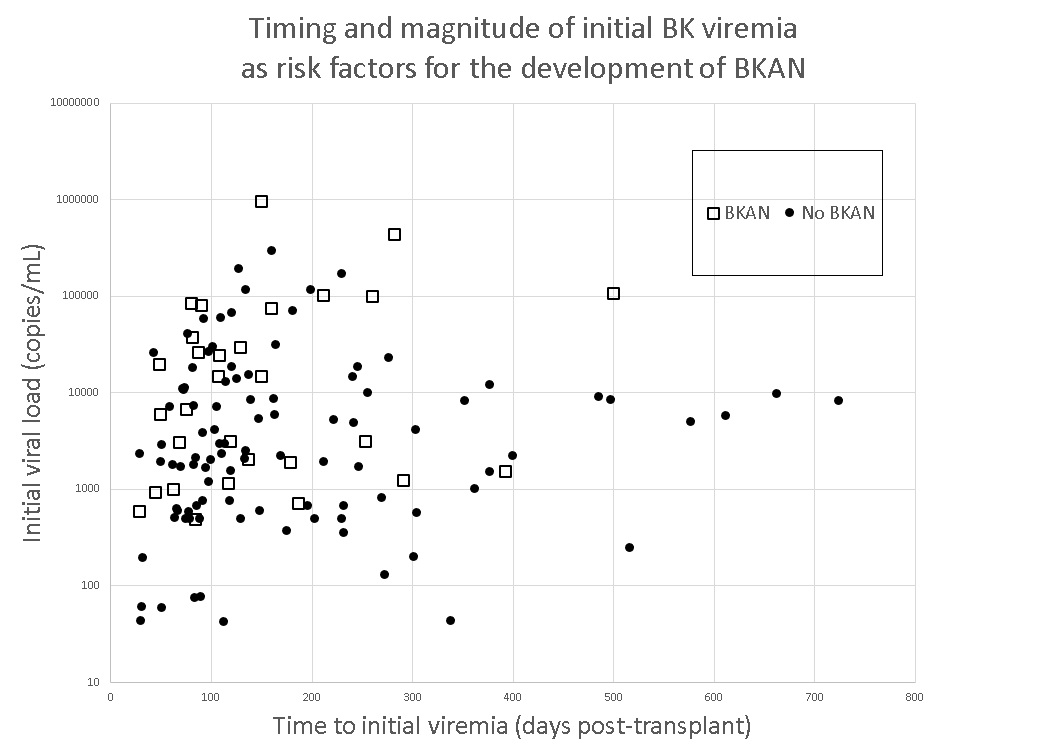Reactivation of BK Polyomavirus after Kidney Transplantation: A Multi-Center Collaboration Examining the Impact of Adherence to a Screening Protocol on Clinical Outcomes
1Warren Alpert Medical School of Brown University, Providence, RI, 2Hartford Hospital, Hartford, CT, 3Geisel School of Medicine at Dartmouth, Hanover, NH, 4Massachusetts General Hospital, Boston, MA, 5Tufts University School of Medicine, Boston, MA, 6Beth Israel Deaconess Medical Center, Boston, MA, 7Boston Children's Hospital, Boston, MA, 8Maine Medical Center, Portland, ME
Meeting: 2020 American Transplant Congress
Abstract number: C-203
Keywords: Multicenter studies, Polyma virus, Screening
Session Information
Session Name: Poster Session C: Kidney: Polyoma
Session Type: Poster Session
Date: Saturday, May 30, 2020
Session Time: 3:15pm-4:00pm
 Presentation Time: 3:30pm-4:00pm
Presentation Time: 3:30pm-4:00pm
Location: Virtual
*Purpose: Reactivation of BK polyomavirus (BK) after kidney transplantation (KT) is common and can lead to adverse clinical outcomes such as allograft nephropathy (BKAN). In an effort to prevent BKAN, many transplant centers screen KT recipients for BK reactivation and may preemptively reduce maintenance immunosuppression to aid in immune control when the virus is detected. The frequency and duration of BK screening after KT varies widely between centers.
*Methods: A collaboration of 15 transplant centers established and implemented a standardized BK screening protocol (plasma or urine qPCR checked at post-transplant months 1-6/9/12/15/18/21/24). As part of a QI project, a retrospective chart review was undertaken to assess clinical outcomes in association with adherence to this screening protocol.
*Results: Eight centers reported data on 744 patients who received a KT between Jan 2016 and Dec 2017. At least 2 years of follow-up data after KT was available for most patients; 129 patients developed BK viremia (17.3%) and 30 patients developed BKAN (4.0%). Centers were adherent to the BK screening protocol for at least 12 months in 45.0% of patients and for 24 months in 29.3% of patients. For patients with viremia, those with at least 12 months of adherence to the screening protocol had a lower initial viral load (16,109 v. 38,000 copies/mL, p = 0.05), but a similar peak viral load (112,947 v. 143,055 copies/mL, p = 0.7) and duration of viremia (191 v. 196 days, p = 0.9). None of these three variables were well correlated with incidence of BKAN. There was a trend towards lower BKAN incidence among those with viremia and at least 12 months (18.8% v. 33.3%, p = 0.1) as well as 24 months (17.6% v. 34.9%, p = 0.04) of protocol adherence.
*Conclusions: Adherence to an established screening protocol was low across multiple centers. Screening may be associated with a decreased incidence of BKAN. More research is needed to determine patient-level and center-level barriers to screening protocol adherence, as well as to explore other factors predictive of progression to BKAN in patients with BK viremia.
To cite this abstract in AMA style:
Rogers R, Cheema F, Chobanian M, Ebcioglu Z, Gilligan H, Gohh R, Goyal N, Pavlakis M, Rodig N, Rossi A, Singh J, Tan CS. Reactivation of BK Polyomavirus after Kidney Transplantation: A Multi-Center Collaboration Examining the Impact of Adherence to a Screening Protocol on Clinical Outcomes [abstract]. Am J Transplant. 2020; 20 (suppl 3). https://atcmeetingabstracts.com/abstract/reactivation-of-bk-polyomavirus-after-kidney-transplantation-a-multi-center-collaboration-examining-the-impact-of-adherence-to-a-screening-protocol-on-clinical-outcomes/. Accessed February 23, 2026.« Back to 2020 American Transplant Congress

